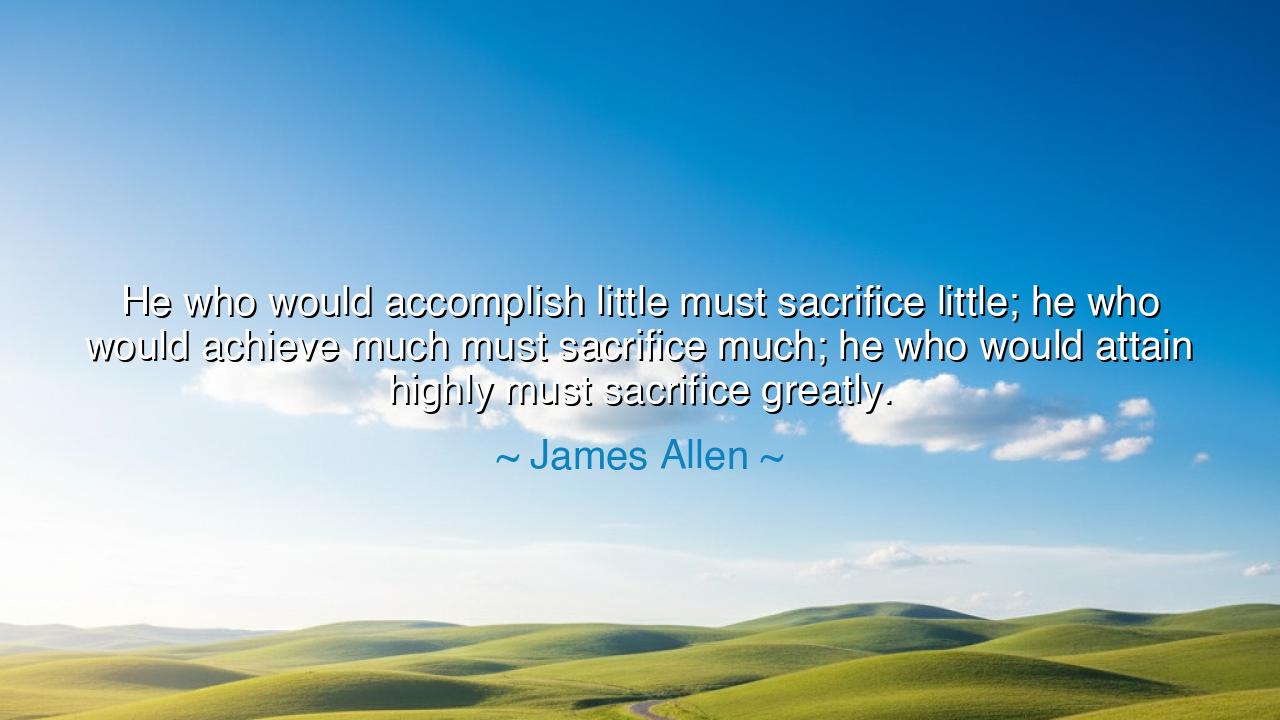
He who would accomplish little must sacrifice little; he who
He who would accomplish little must sacrifice little; he who would achieve much must sacrifice much; he who would attain highly must sacrifice greatly.






"He who would accomplish little must sacrifice little; he who would achieve much must sacrifice much; he who would attain highly must sacrifice greatly." Thus spoke James Allen, the quiet philosopher of self-mastery, whose words burn with the same eternal truth that guided the sages of old: there can be no greatness without sacrifice. Every dream exacts a price, every triumph demands surrender. Those who would rise must first lay something precious upon the altar—time, comfort, ease, or pride. The higher the ascent, the heavier the offering required.
In this saying, Allen unveils the divine law that rules all creation. Nothing is gained without something given. The earth yields no harvest without the seed first dying in the soil; the mind gains no wisdom without releasing ignorance; the soul grows only when it renounces what chains it to the lesser. To accomplish, to achieve, to attain—each of these words is born from the root of giving up, of letting go, of transforming. Thus, sacrifice is not loss—it is the sacred exchange by which we trade the transient for the eternal, the easy for the excellent, the common for the divine.
In the life of James Allen himself, we see this truth lived out. Born into poverty in nineteenth-century England, he faced the bitterness of hardship from his youth. His father’s untimely death cast his family into struggle, yet Allen did not curse the burden—he bore it. He labored by day and studied by night, surrendering leisure and pleasure for the pursuit of wisdom. From that sacrifice arose one of the most influential works of modern philosophy, As a Man Thinketh, a book that has guided countless souls toward discipline, purpose, and faith. Allen’s greatness was not granted to him; it was carved by his willingness to give up lesser things for greater ends.
History, too, testifies to this eternal law. Consider Mahatma Gandhi, who sacrificed comfort, wealth, and freedom for the dream of India’s independence. He renounced luxury, embraced simplicity, and bore imprisonment, yet his sacrifice became his strength. Or Marie Curie, who gave her youth and health to her research, laboring through nights and suffering illness in her quest to uncover the hidden laws of nature. The radiance of her discovery was born from her willingness to pay the price. Such souls teach us that all high attainment is the fruit of sacred suffering—of giving when others rest, of enduring when others abandon.
The ancients understood this truth in their bones. The warrior trained in solitude before glory. The poet fasted from pleasure to hear the song of the muse. The prophet withdrew to the wilderness before he could speak to the world. In all these, the pattern is the same: sacrifice precedes greatness. One cannot climb with arms full of comfort, nor rise to the heavens while clinging to the earth. The man who would conquer the mountain must leave behind his burdens at its base.
Yet, sacrifice is not merely about what we lose—it is about what we become. When we give up what is small for what is noble, the soul itself expands. Each act of discipline strengthens the spirit; each renunciation of ease sharpens the will. In this way, sacrifice is the fire through which potential becomes power. To attain highly, one must first become worthy of the height—and that worthiness is forged in the crucible of surrender.
So let this truth settle upon your heart: there is no crown without the cross. If you wish to accomplish little, give little. If you desire greatness, give greatly. Do not seek an easy road, for ease breeds weakness. Choose instead the path that costs you, for it is there that strength and meaning are born. Rise early when others sleep. Persist when others quit. Endure when others complain. Each small sacrifice, repeated faithfully, builds the foundation of your destiny.
And when at last you stand upon the summit of your endeavor, you will see that the sacrifices were not burdens—they were blessings. For in giving of yourself, you will have gained yourself. In losing comfort, you will have found power. And in offering your all, you will have become what you were always meant to be—one who attained highly by the sacred law of sacrifice.






AAdministratorAdministrator
Welcome, honored guests. Please leave a comment, we will respond soon